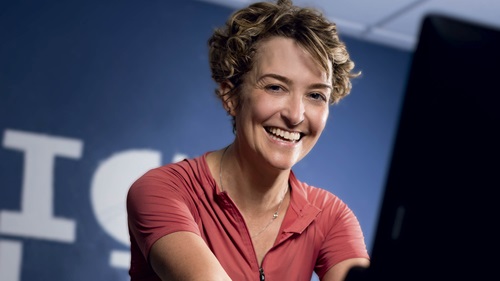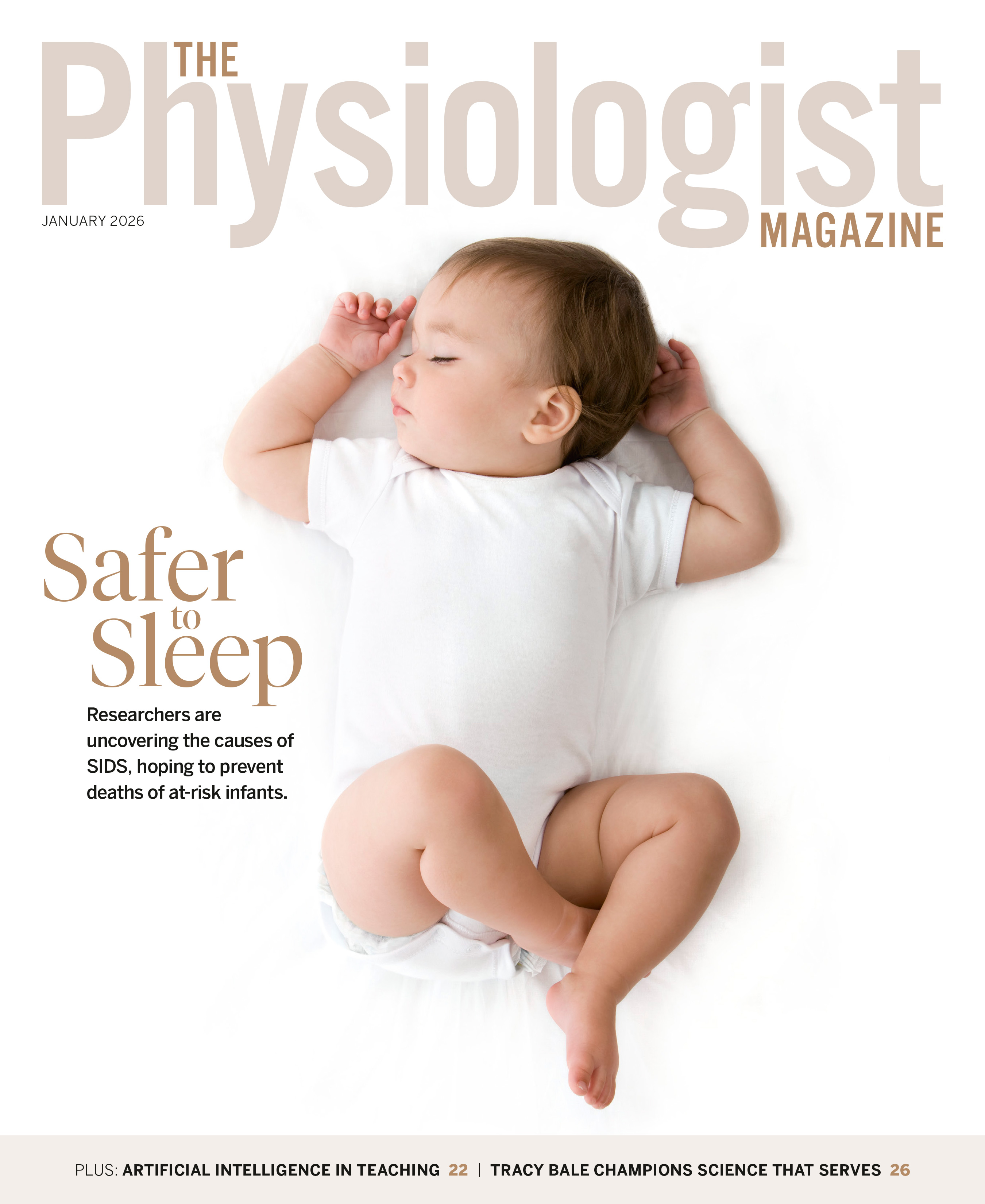A Love for Discovery
The turning point that led Lacy Alexander, PhD, FAPS, to find new ways to improve women’s health.
By Dara Chadwick

You might say education was the family business for Lacy Alexander, PhD, FAPS, professor of kinesiology at The Pennsylvania State University and chair of the 2024 APS Integrative Physiology of Exercise conference. Her dad was a high school math teacher. Her mom taught kindergarten, first grade and, later, middle school. Her maternal grandfather taught geology.
There was a heavy expectation that Alexander would become an educator too. “Everybody told me, ‘You’re going to be a teacher,’” she says. But back then, Alexander wanted nothing to do with the education field—she wanted to become a doctor.
Alexander describes herself as a “typical pre-med student” at the University of Oregon in Eugene, where she double-majored in human physiology (then called exercise and movement science) and general science. Her triple minor was in chemistry, biology and psychology.
Her path to medical school seemed clear. She applied as a rising senior with a 3.6 grade point average—and didn’t get in. “That was the first thing I ever failed at in my academic career,” she says. “It crushed me.”
Time for a Change
Not sure what to do next, Alexander took an exercise physiology class during her senior year. It was a turning point she never saw coming, she says. The class introduced her to Gary Klug, PhD, one of her most influential mentors. She worked with him in his lab, where they tried to isolate the sarcoplasmic reticulum from muscle in rats who’d been exercise trained.
“It was exciting to me that you could take all this benchtop science and do things that had both exercise and clinical applications,” Alexander says. “You could observe pathologies like cardiac pathology and respiratory pathology, as well as metabolic processes, through noninvasive testing. Everything fell into place, and it was like this light bulb went on in my head. It was super exciting and continues to be exciting for me.”
Klug encouraged her to consider a master’s degree. Soon, Alexander was accepted into the University of Oregon’s human physiology program. She was paired with Christopher Minson, PhD, FAPS, then a new assistant professor, and helped him build his laboratory, studying the regulation of human skin flow and the role of nitric oxide in aging. Alexander also worked part time as a cardiac rehab therapist at a nearby hospital to get clinical hours because she thought she might reapply to medical school.
There was just one problem—she hated the hospital job. “It was so repetitive,” Alexander says. “I’d come home and cry, and my husband at the time would say, ‘You come back from teaching a lab and you’re excited. You come back from working with patients at the hospital and you’re in a terrible mood. What does this mean?’”
Turns out, Alexander was destined to become an academic. “What I learned is that I’m a discoverer,” she says. “I want to write the cookbook. I don’t want to follow the cookbook.”
She earned her master’s degree in 2002 and says she doesn’t regret the time she spent exploring a medical career. “I tell my students that some of the most valuable lessons are those where you learn what you’re not supposed to do,” she says.
Relatable Research
Alexander decided to embrace an academic future, setting her sights on earning a PhD. She continued her work as a lab research technician while she decided where to go next. Ultimately, she headed to Penn State to pursue a PhD in kinesiology, with an emphasis in exercise physiology. She completed her dissertation on the role of nitric oxide in the regulation of skin, blood flow and thermal stress in aging and hypertension, earning her degree in 2007.
Today, Alexander is a full professor at the historic Noll Laboratory (the nation’s first free-standing human performance laboratory), overseeing three PhD students and a few undergraduates. The research project she’s most proud of focuses on examining mechanisms underlying accelerated cardiovascular disease risk in women with endometriosis. It’s a project born from Alexander’s own experience with the condition.
She says she talked with some of her physicians about the underlying inflammation involved in the condition’s etiology. “I was curious about whether women with endometriosis develop cardiovascular disease sooner in their lifespan,” she says. In 2017, she talked with her own doctor, Hugh Taylor, MD, a renowned endometriosis expert, who shared some studies with her. Alexander then suggested that they submit some research grants.
In 2022, Alexander received R01 funding from the National Institutes of Health to study different interventions to mitigate cardiovascular disease risk in women with endometriosis. She and her co-principal investigator, Nina Stachenfeld, PhD, FAPS, of Yale University, are also studying the underlying mechanism for accelerated cardiovascular disease risk in women with endometriosis.
“We know that endometriosis is not a disease isolated to reproductive organs,” Alexander says. “It’s a systemic inflammatory disease. If you look at the inflammation profile of endometriosis, you see that the inflammatory markers that are elevated are the same inflammatory markers that are elevated with atherosclerotic cardiovascular disease.”
These same elevated signature biomarkers in endometriosis and atherosclerosis have been a research focus, Alexander says. A study in Taylor’s lab showed four times the atherosclerotic plaque load in a mouse model prone to cardiovascular disease that was also given endometriosis.
“It’s a huge proof of concept to have these data,” Alexander says. “What we see in humans is that these early markers of vascular dysfunction that are predictive of atherosclerotic cardiovascular disease are present in women with endometriosis with no other cardiovascular disease risk factors. We’re trying to show that we can put people on some different interventions, such as selective estrogen receptor modulation, that will improve their cardiovascular disease risk. We may also be able to improve their health and well-being because most of the drugs available for these women are just awful. Because I suffer from endometriosis too, I relate.”
A Teacher After All
Alexander’s ability to relate has also fueled her success as an educator. In addition to supervising students in the lab, she teaches environmental physiology, an elective course for juniors and seniors, and a graduate-level research methods course. “Teaching is fun,” she says. “I love getting in front of my students in the classroom.”
She also occasionally teaches a general exercise physiology course. That’s the class that reminds her of when she discovered her own love of physiology. “I probably spend too much time on the muscle length tension curve, just because I think about myself sitting in that classroom,” she says. “I remember how excited I got thinking about that graph.”
When she’s not teaching or in the lab, Alexander spends plenty of time with her two Portuguese water dogs, Ruthie and Patsy. She also loves to ride her Peloton bike and recently got to ride in-studio with Peloton instructor Christine D’Ercole. “That was one of my finest moments,” she says.
Looking back, Alexander now happily admits she was wrong in thinking academia wasn’t for her. She says she sometimes marvels that the girl who graduated in a class of 16 students from a high school in Prospect, Oregon, now teaches at a university with 50,000 undergraduate students. And even though her path didn’t lead to where she originally thought she’d be, Alexander knows she ended up exactly where she belongs.
This article was originally published in the September 2024 issue of The Physiologist Magazine. Copyright © 2024 by the American Physiological Society. Send questions or comments to tphysmag@physiology.org.
The Physiologist Magazine
Read the Latest Issue
Don’t miss out on the latest topics in science and research.
Contact Us
For questions, comments or to share your story ideas, email us or call 301.634.7314.
8 Questions with Lacy Alexander
What’s your best piece of career advice?
Volunteer early, but say no. People who do a good job on things get asked to do more things and it can take over your life. A colleague has given me a “no”
punch card. Every time I say no, especially to something major, I get a punch. At the end of the card is a nice bottle of wine. I’ve not yet gotten to the nice bottle of wine.
What’s your idea of happiness?
Coming home
to my dogs at the end of the day.
What’s your greatest fear?
Radicalism.
What three traits do you value in a colleague?
Trust, sense of humor and an ability to figure things out.
Who do you most admire?
My parents, Linda and Don Alexander.
What talent would you most like to have?
I’d like to be able to sing. It would be nice to sing “Happy Birthday” to somebody in a bar and not be flat.
What do you consider your greatest achievement (so far)?
My students.
What’s your most treasured possession?
They’re not really possessions because they’re living things, but I would probably
say my dogs.


